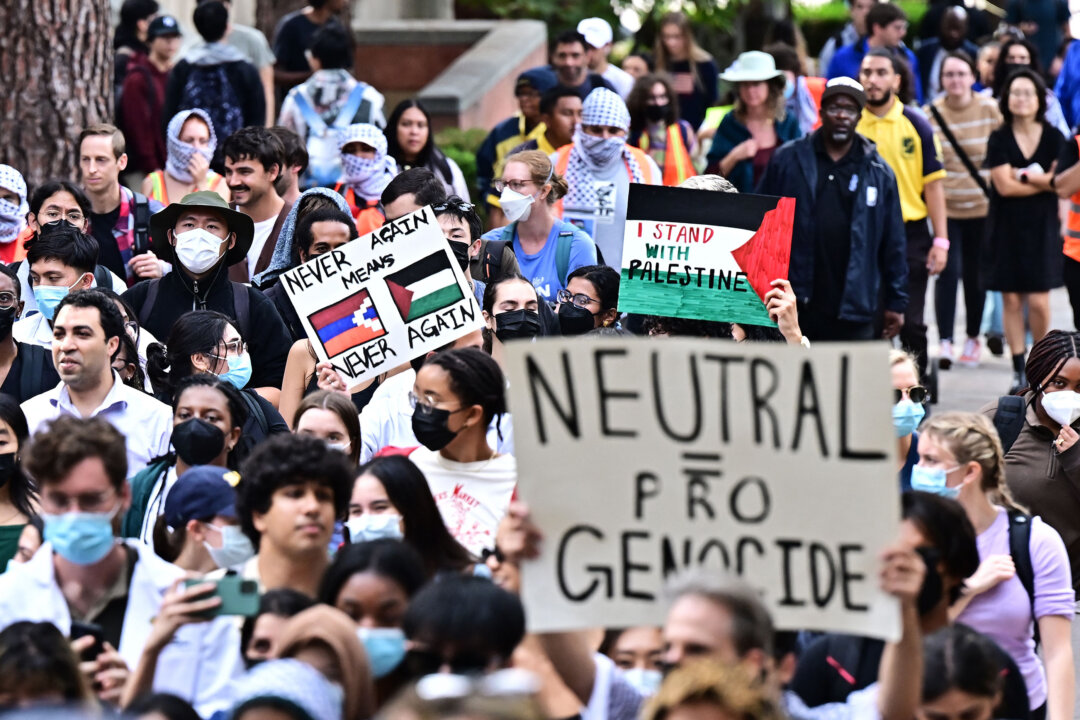University of California professors push back on UC president’s call for ‘viewpoint-neutral’ history of Middle East
A group of University of California professors signed a public letter pushing back on the UC president’s efforts to develop what he described earlier this month as a “viewpoint-neutral history of the Middle East,” saying it violates their academic freedom.
“We find your use of the term ‘viewpoint-neutral history’ to be wrong in this context and call upon you to rescind it,” the letter, signed by about 150 UC professors , states.
The letter stems from remarks by University of California President Michael V. Drake to the UC Board of Regents two weeks ago about Hamas’ attacks on Israel on October 7 and Israel’s ensuing military campaign in Gaza. Drake announced several initiatives to address the community’s concerns, including $7 million of added funding.
According to his remarks, $2 million will be used to “develop educational programs at each UC campus ... focused on better understanding anti-Semitism and Islamophobia, how to recognize and combat extremism, and a viewpoint-neutral history of the Middle East.”
Another $2 million will be devoted to training leadership, staff and faculty, Drake said. “The goal is to ensure that UC leaders and educators are equipped with the knowledge they need to respond when issues arise and that our university policies are supportive, preventative, and viewpoint-neutral,” he said.
The academic debate comes amid the heightened tensions on college campuses related to heated protests about the Israel-Hamas war. The University of California system is just one of the many higher-education institutions that have struggled in recent weeks to balance students’ free speech rights while maintaining a healthy atmosphere for Muslim, Arab and Jewish students and appeasing opinionated donors .
Drake’s remarks to the UC board focused on the local impacts of the war.
“Still, many of our students, faculty, and staff are suffering right here at home. Some feel unsafe leaving their dorm rooms. Some worry about what they can and cannot say in their classrooms. Some feel helpless and unsure about how to navigate this complex situation in class or at work. Some have been doxxed for using their voices, and some have faced outright violence. They are fearful, they are vulnerable, and they have asked for our help,” he said.
“Today we are doubling down on who we are: an educational institution that’s guided by facts and data, but also a moral compass that helps us find our way to compassion and understanding in difficult moments,” he concluded.
In response, the professors’ letter states that university professors should be allowed to present conflicting viewpoints on issues and warns of a potential “chilling” effect on other academic fields.
“We are all committed to inclusivity and academic excellence, but to suggest that the UC administration should determine how and what we teach will set a chilling precedent for our field and the many others engaged in teaching topics that might be considered controversial or divisive, like climate change, the history of racism, and genocide and mass atrocity,” the letter states.
Related Articles
The letter also argued the president is appearing to call “into question academic integrity of the community of University of California scholars already engaged in the historical study and teaching of the Middle East.”
Further, the letter took issue with the “viewpoint-neutral” framing as well as Drake’s use of the word “preventative” in his remarks. The term generally refers to a policy that prevents people from being drawn into extremism, but the letter alleges that this could lead to constraints or censorship of critical speech.
“We welcome your commitment to increasing resources for studying the history of the Middle East, which would ostensibly be dedicated to hiring new faculty and encouraging the study of languages spoken in the region,” the letter states. “We insist, however, that professional historians and those in allied fields trained in the study of the Middle East are best-positioned to determine the curriculum, safeguard rigorous standards of research and teaching, and protect the climate of open discussion and critical inquiry which are the cornerstones of our scholarly community.”
Asked about the professors’ letter, the University of California issued a statement noting the proposed programming is voluntary.
“The University of California remains deeply committed to shared governance and the academic freedom of our faculty,” the university said. “The president’s remarks were referencing voluntary educational programming on our campuses, not classroom content or curriculum. We are actively working with our campuses to determine how to distribute these funds in ways that will benefit our campus communities.”
The-CNN-WireTM & © 2023 Cable News Network, Inc., a Warner Bros. Discovery Company. All rights reserved.




:quality(70)/cloudfront-us-east-1.images.arcpublishing.com/cmg/FMTNG25SZVNB7M2UVZT5GPNRV4.jpg)










